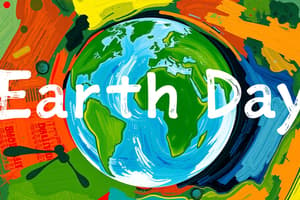Podcast
Questions and Answers
Earth Day is observed on April 23rd every year.
Earth Day is observed on April 23rd every year.
False (B)
The first Earth Day was celebrated in 1970.
The first Earth Day was celebrated in 1970.
True (A)
Earth Day was initiated by United States Senator Gaylord Nelson.
Earth Day was initiated by United States Senator Gaylord Nelson.
True (A)
The global perspective of Earth Day emerged in 2000.
The global perspective of Earth Day emerged in 2000.
Earth Day promotes awareness about social issues.
Earth Day promotes awareness about social issues.
Earth Day serves as a reminder to protect only human well-being.
Earth Day serves as a reminder to protect only human well-being.
Earth Day encourages only individuals to take steps to mitigate environmental issues.
Earth Day encourages only individuals to take steps to mitigate environmental issues.
One of the activities mentioned is environmental film screenings at cinemas.
One of the activities mentioned is environmental film screenings at cinemas.
Earth Day does not promote environmental literacy among participants.
Earth Day does not promote environmental literacy among participants.
Future Earth Day celebrations will not focus on climate action.
Future Earth Day celebrations will not focus on climate action.
Community clean-up events are common activities during Earth Day celebrations.
Community clean-up events are common activities during Earth Day celebrations.
Earth Day events will not incorporate technology like augmented reality.
Earth Day events will not incorporate technology like augmented reality.
Flashcards are hidden until you start studying
Study Notes
Earth Day: A Global Celebration of Our Planet's Future
Earth Day, observed annually on April 22nd, is a momentous occasion that brings people together to advocate for environmental protection, conservation, and sustainability. This international event, which originated over half a century ago, holds a rich history and profound importance that continues to shape our approach to environmental stewardship.
Origins of Earth Day
The first Earth Day was celebrated in 1970, spearheaded by United States Senator Gaylord Nelson. After witnessing a massive oil spill in Santa Barbara, California, in 1969, Senator Nelson sought to raise awareness about environmental issues and inspire action across the nation. His efforts culminated in the organization of a national teach-in on college campuses, involving 10% of the US population at the time.
The global perspective of Earth Day emerged in 1990, when the United Nations General Assembly proclaimed April 22nd as International Mother Earth Day. This shift in scope reflected a growing global consciousness about the interconnectedness of environmental challenges.
Importance of Earth Day
Earth Day serves as an annual reminder of the urgent need to protect our planet, its ecosystems, and the well-being of all species. The event promotes:
-
Awareness: Earth Day raises awareness about environmental issues, such as climate change, deforestation, pollution, and the unsustainable use of resources.
-
Action: Earth Day encourages individuals, businesses, and governments to take tangible steps to mitigate these issues. The event provides a platform for sharing best practices and developing collaborative solutions.
-
Education: Earth Day fosters a culture of learning and understanding about the natural world and our impact on it. The event promotes environmental literacy and helps to cultivate a new generation of environmental stewards.
-
Empowerment: Earth Day provides an opportunity for individuals to engage in civic action, such as volunteering, petitioning, and advocating for environmental policies. The event empowers people to take control of their own environmental futures.
Earth Day Activities and Events
Earth Day celebrations are diverse and vary from location to location. Some common events and activities include:
-
Environmental education programs: Schools, colleges, and universities organize events, workshops, and seminars to educate students about environmental issues and promote sustainable practices.
-
Community clean-up events: Volunteers participate in clean-up initiatives, such as beach clean-ups, river clean-ups, and urban clean-ups, to reduce pollution and improve local environments.
-
Nature walks and hikes: Individuals and groups organize guided nature walks and hikes to explore local ecosystems and learn about their importance.
-
Environmental film screenings: Documentaries and other films about environmental issues are screened at local venues, such as cinemas and community centers.
-
Panel discussions and debates: Speakers, experts, and scholars come together to discuss environmental issues and share their perspectives.
The Future of Earth Day
The annual celebration of Earth Day continues to evolve and adapt to the changing challenges facing our planet. In the coming years, Earth Day is likely to:
-
Expand its scope: Earth Day is increasingly becoming a global event, with celebrations occurring in countries around the world. The event's reach is likely to continue growing, as environmental concerns become more pressing.
-
Emphasize climate action: With the increasing urgency of climate change, Earth Day is likely to place a stronger focus on climate action and mitigation.
-
Incorporate technology: Earth Day events will increasingly incorporate technology, such as virtual reality, augmented reality, and artificial intelligence, to educate and engage people in environmental issues.
-
Promote environmental justice: Earth Day will continue to highlight the disproportionate impact of environmental issues on marginalized communities and advocate for environmental justice.
Earth Day is a powerful reminder of the importance of environmental protection and a celebration of our planet's natural beauty and abundance. As we continue to face the challenges of the 21st century, Earth Day is an essential tool in our quest to build a sustainable and equitable future.
Studying That Suits You
Use AI to generate personalized quizzes and flashcards to suit your learning preferences.




